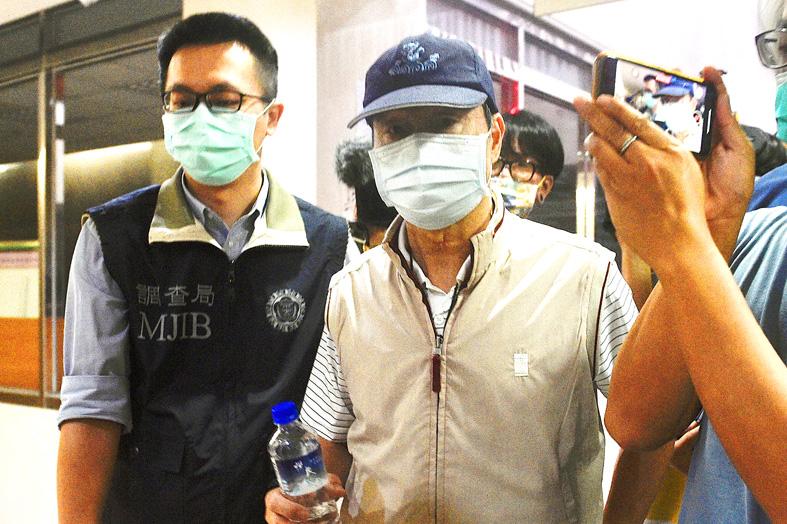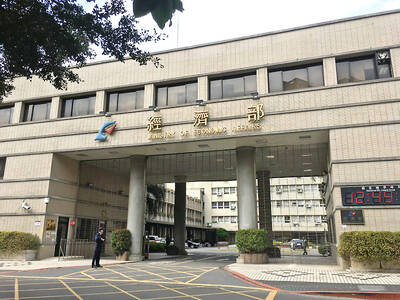Two retired air force officers, including a former major general, were yesterday morning released on bail after overnight questioning by prosecutors about their alleged involvement in a Chinese espionage ring.
Retired air force major general Chien Yao-tung (錢耀棟) and retired lieutenant colonel Wei Hsien-yi (魏先儀) were released on bail of NT$200,000 and NT$300,000 respectively after being formally named as suspects in the investigation.
The Chinese-language Mirror Media last month reported that prosecutors were investigating allegations that a Hong Kong businessman, surnamed Tse (謝), had tried to organize a spy ring in Taiwan under instructions from the Chinese Ministry of State Security.

Photo: George Tsorng, Taipei Times
Tse is suspected to have cultivated relationships with multiple retired military officers, including Chien and Wei, and arranged dinners and banquets at which they were encouraged to invite other active duty service members, the report said.
The report added that former deputy minister of national defense Chang Che-ping (張哲平) was being investigated for attending several dinners with members of the ring, as well as for allegations that his wife had traveled to Hong Kong at their expense.
Chang, the head of National Defense University, said his wife had paid for the trip herself.
He had followed military ethics guidelines at all social events and in interactions with classmates, retired colleagues and friends, he said, adding that he “absolutely committed no illegalities in speech or action.”
Chang has not been publicly named as a suspect in the case. He served as deputy minister of national defense from 2019 until the end of June, when he was transferred to his current post at the university.
The Taipei District Prosecutors’ Office on Wednesday ordered a national security team at the Investigation Bureau to search the homes of Chien and Wei, and to summon the pair for questioning as defendants in the case.
Following overnight interrogations, the prosecutors’ office issued bail terms for the two men based on their suspected contraventions of the National Security Act (國家安全法).

LIMITS: While China increases military pressure on Taiwan and expands its use of cognitive warfare, it is unwilling to target tech supply chains, the report said US and Taiwan military officials have warned that the Chinese People’s Liberation Army (PLA) could implement a blockade within “a matter of hours” and need only “minimal conversion time” prior to an attack on Taiwan, a report released on Tuesday by the US Senate’s China Economic and Security Review Commission said. “While there is no indication that China is planning an imminent attack, the United States and its allies and partners can no longer assume that a Taiwan contingency is a distant possibility for which they would have ample time to prepare,” it said. The commission made the comments in its annual

DETERMINATION: Beijing’s actions toward Tokyo have drawn international attention, but would likely bolster regional coordination and defense networks, the report said Japanese Prime Minister Sanae Takaichi’s administration is likely to prioritize security reforms and deterrence in the face of recent “hybrid” threats from China, the National Security Bureau (NSB) said. The bureau made the assessment in a written report to the Legislative Yuan ahead of an oral report and questions-and-answers session at the legislature’s Foreign Affairs and National Defense Committee tomorrow. The key points of Japan’s security reforms would be to reinforce security cooperation with the US, including enhancing defense deployment in the first island chain, pushing forward the integrated command and operations of the Japan Self-Defense Forces and US Forces Japan, as

‘TROUBLEMAKER’: Most countries believe that it is China — rather than Taiwan — that is undermining regional peace and stability with its coercive tactics, the president said China should restrain itself and refrain from being a troublemaker that sabotages peace and stability in the Indo-Pacific region, President William Lai (賴清德) said yesterday. Lai made the remarks after China Coast Guard vessels sailed into disputed waters off the Senkaku Islands — known as the Diaoyutai Islands (釣魚台) in Taiwan — following a remark Japanese Prime Minister Sanae Takaichi made regarding Taiwan. Takaichi during a parliamentary session on Nov. 7 said that a “Taiwan contingency” involving a Chinese naval blockade could qualify as a “survival-threatening situation” for Japan, and trigger Tokyo’s deployment of its military for defense. Asked about the escalating tensions

The Ministry of Economic Affairs said it plans to revise the export control list for strategic high-tech products by adding 18 items under three categories — advanced 3D printing equipment, advanced semiconductor equipment and quantum computers — which would require local manufacturers to obtain licenses for their export. The ministry’s announcement yesterday came as the International Trade Administration issued a 60-day preview period for planned revisions to the Export Control List for Dual Use Items and Technology (軍商兩用貨品及技術出口管制清單) and the Common Military List (一般軍用貨品清單), which fall under regulations governing export destinations for strategic high-tech commodities and specific strategic high-tech commodities. The